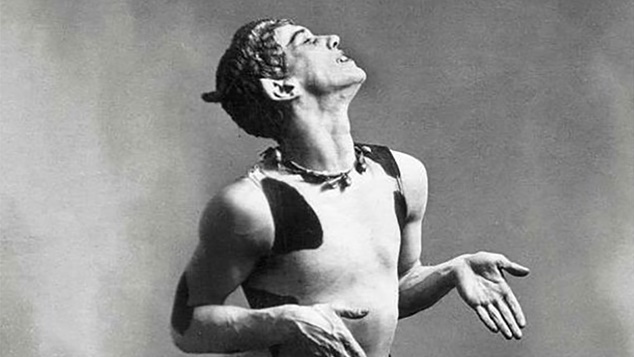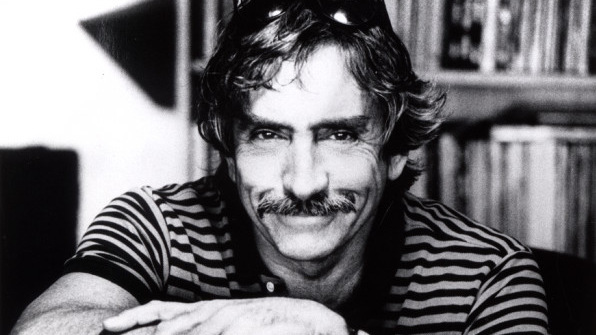Vaslav Nijinsky was born on this day in either 1889, or 1890 – the date is disputed. Historians however can agree that he was born in the city of Kyiv, which was part of Russia at that time. While he was born in Russia, Nijinsky always considered himself to be Polish. His parents were Polish dancers who were traveling with the Setov Opera Company.
The young Vaslav spent his youth touring with the company and also trained as an dancer, as did his older brother Stanislav and his younger sister Bronislava. When he was just nine years old Nijinsky was accepted into the Imperial Ballet School in St Petersberg, one of the most revered dance institutions in the world.
When he graduated in 1907 he joined the Russian Imperial Ballet, Nijinsky skipped being a member of the Corps de Ballet, and almost immediately began getting starring roles.

In 1909 he joined the Ballet Russes in Paris. The new company was started by impresario Sergei Diaghilev. Nijinsky and Diaghilev became lovers, and the young dancer soon began choreographing his own works while getting acclaim for his mesmerising performances.
His 1909 work L’après-midi d’un faune is often cited as the first modern ballet, some audience members were shocked at its premiere by some of its sexually suggestive scenes.
In 2013 he married Hungarian Romola de Pulsky while the company was touring South America. The marriage brought an end to his relationship with Diaghilev, who soon fired him from the company. The new couple had two daughters, but struggled to find work, Nijinsky’s attempts to start his own company failed.
During World War I, Nijinsky was interred in Budapest and kept under house-arrest until 1916. After the war the family settled in Switzerland. Nijinsky was diagnosed with schizophrenia in 1919 and committed to a mental asylum. For the next 30 years he was in and out of institutions and never danced again and rarely spoke.
In 1947 the family moved to England, living in Virginia Water, Surrey. Nijinsky died on 8th April 1950 in a London hospital, his passing attributed to kidney failure. He was 60 or 61 years old.
In 1974 playwright Terrence Rattigan was commissioned by the BBC to write a play about Nijinsky and Diaghilev. The dancer’s widow Romola contacted the broadcaster and objected to her husband being depicted as a homosexual, by a writer who was also a homosexual. Rattigan withdrew the play and prohibited it from being performed during his lifetime. Rattigan died in 1974, and Romola passed in 1978, but the play was not performed until 2013 when it was staged by the Chichester Festival.
Over the years Nijinsky has been portrayed in plays, ballets and film many times, and has also had many poems written about him.

Edward Albee was born on this day in 1928
American author Edward Albee achieved worldwide success with is play Who’s Afraid of Virgina Woolf? His works were considered to be a significant part of American theatre in the post war period. He was awarded the Pulitzer Prize three times, and his works were also adapted for the screen.
Albee’s most famous work Who’s Afraid of Virgina Woolf opened on Broadway in 1962. The three-act play depicts the marriage breakdown of a middle-aged couple. The production won the Tony Award for Best Play in 1963.
The work was nominated for the Pulitzer Prize by the award’s committee decided not to grant any award that year and said they had concerns with the play’s themes and its use of profanity.
The play was adapted for the screen in 1966 with Michael Nichols directing Elizabeth Taylor and Richard Burton. Taylor won the Best Actress Oscar for her portrayal.
Albee’s early career was greatly influenced by the European Theatre of the Absurd. His other works include A Delicate Balance (1967), Seascape (1975) and Three Tall Women (1994) – all three works won the Pulitzer Prize. Altogether Albee authored over 30 plays during his career.
While his early plays were critical and commercial successes, his subsequent work was not well received. The playwright has a career resurgence in the late ’90s and he went on to publish some of his more successful works in the latter part of his career.
In 1996 Albee was honoured by the Kennedy Centre and he was presented with a National Medal for the Arts by President Bill Clinton, who described Albee as a writer who had inspired a generation of dramatists.
One of Albee’s later career successes was The Goat, or Who is Sylvia? which premiered in 2002. The play focuses on a man who has fallen in love with a goat.
Albee was adopted at birth and little is known about his biological parents. He was brought up by a rich family who owned several theatres but left home in his late teenage years. Albee had said he was thrown out because his parents didn’t approve of his aspirations to be a writer.
Moving to New York City’s Greenwich Village region Albee did various jobs, including being a messenger for Western Union, while he wrote his first play. He first found success outside of the USA, his play The Zoo Story was first produced in Berlin in 1958.
Albee was openly gay at a time when being gay was still illegal. Prior to his death in 2016 the playwright said he wanted to be remembered not as a gay playwright, but as a playwright who happened to be gay. His long-term partner, sculptor Jonathan Thomas passed away in 2005, the couple had been together since 1971.
In the 1970 Albee wrote a screenplay for a film about the dancer Nijinsky. The film was to be directed by Tony Richardson and was set to star Rudolph Nureyev in the title role. The film was cancelled when producer Harry Saltzman realised he did not have sufficient funds to bring the film to life.
Image: Edward Albee. Special Collections, University of Houston Libraries. University of Houston Digital Library. Web. September 16, 2016. http://digital.lib.uh.edu/collection/p15195coll6/item/370.




